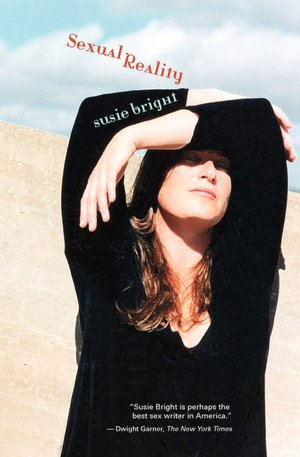 If anyone could pen a mercilessly cheerful paen to the erotic potential of internet hating, it would be Susie Bright. She is the sexual up with people, the Herbert Hoover of orgies — one in every pot (or, I’m sure, with pot, if that’s your thing). She faced even giving birth with a sex toy in her hand, and insists it was good for her, Caesarian and all. Every experience is a sexual experience waiting to happen. Even, presumably, the exhaustion of contemplating turning every experience into a sexual experience waiting to happen.
If anyone could pen a mercilessly cheerful paen to the erotic potential of internet hating, it would be Susie Bright. She is the sexual up with people, the Herbert Hoover of orgies — one in every pot (or, I’m sure, with pot, if that’s your thing). She faced even giving birth with a sex toy in her hand, and insists it was good for her, Caesarian and all. Every experience is a sexual experience waiting to happen. Even, presumably, the exhaustion of contemplating turning every experience into a sexual experience waiting to happen.
I’m reading Susie Bright’s Sexual Reality because I’m writing about William Marston, the creator of Wonder Woman, and a certified lesbophiliac (he had a card and everything. It’s in the Smithsonian Archive.) Anyway, Bright has a short essay on male lesbophilia which is about the most positive thing ever written on male lesbophilia. If there is a specialist sexual interest, chances are that there is a Susie Bright essay that is the most positive thing ever written about it. If space aliens land tomorrow and whisk us all away into humiliating sex slavery involving the surgical creation of artificial orifices, Susie Bright will have an article out on Thursday about the beauty of artificial orifices and the appendages what fit in them.
Anyway. The fact is that her article about male lesbophilia is quite good — she argues lesbophilia is about identifying with women rather than saving women or invading women’s spaces, which seems to fit Marston quite well. Someone needed to write the most positive article about male lesbophilia ever, after all, and why not Susie Bright? Same with alien orifices or dildos or incest or sex with dalmations or alien orifice incestuous sex with dildos and dalmations, for that matter. Bright’s smart and her prose is punchy; better her than Camille Paglia or Donna Haraway, that’s for sure.
It would just be nice, occasionally, if there were an acknowledgement that maybe, somewhere, somehow, there might possibly be a situation in which freely expressing sexuality might not be ideal in every way, for feminism or for women or for anybody. Does it really make sense to turn an essay on the Clarence Thomas hearing into a lament about women’s sexual repression? To turn a discussion of a date-rape gang-bang into an excited effusion about the awesome sexual agency of strippers? Surely there are some problems or some situations somewhere to which the answer is not, “Have more and better sex!”
Bright is, of course, strongly anti-censorship; it’s close to the first thing she tells us in her intro to Sexual Reality If you think that 2 Live Crew might be kind of sexist, you are, apparently, repressed and sexphobic. She concludes that same intro with an enthusiastic (of course!) embrace of the power of art. “If others didn’t write words to move me,” she says, “I don’t know if I would move. The best results of my work has been to be a muse, to inspire others to take a chance.”
I’m sure Bright sees these positions as continuous; you shouldn’t censor art, because art moves and inspires. But there’s another side to that, it seems to me. If art can move you to do great things, it can also, presumably, inspire you to actions which maybe aren’t all that great. If what we read and dream can affect us, then it can affect us, for ill as well as for good. And that certainly goes for sexual dreams as well as for every other kind. Pornography doesn’t have to be more evil than anything else…but everything else is pretty evil. Why not pornography too?
________________________
Googling around I found out that I was right; Susie Bright really is the person to write a sex-positive piece about haters. Here she is with a nicely appreciative piece about that supreme hater, Andrea Dworkin.
Bright makes me want to read Dworkin’s novels, actually. If I’m lucky, maybe I’ll hate them.
